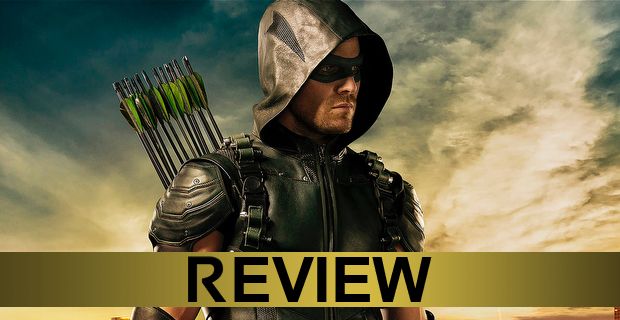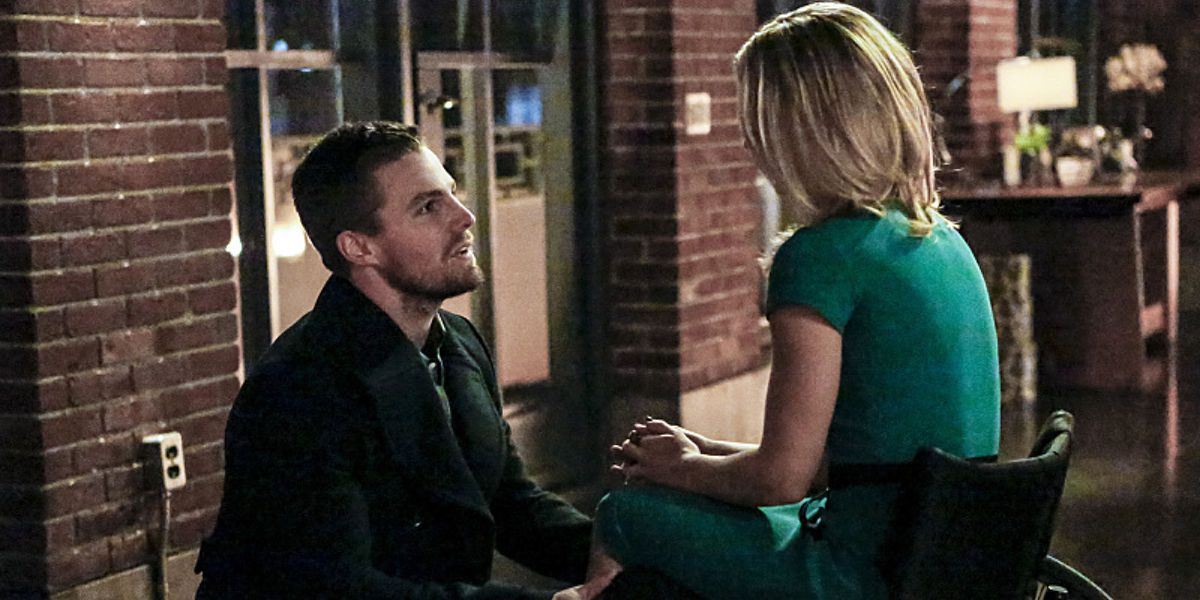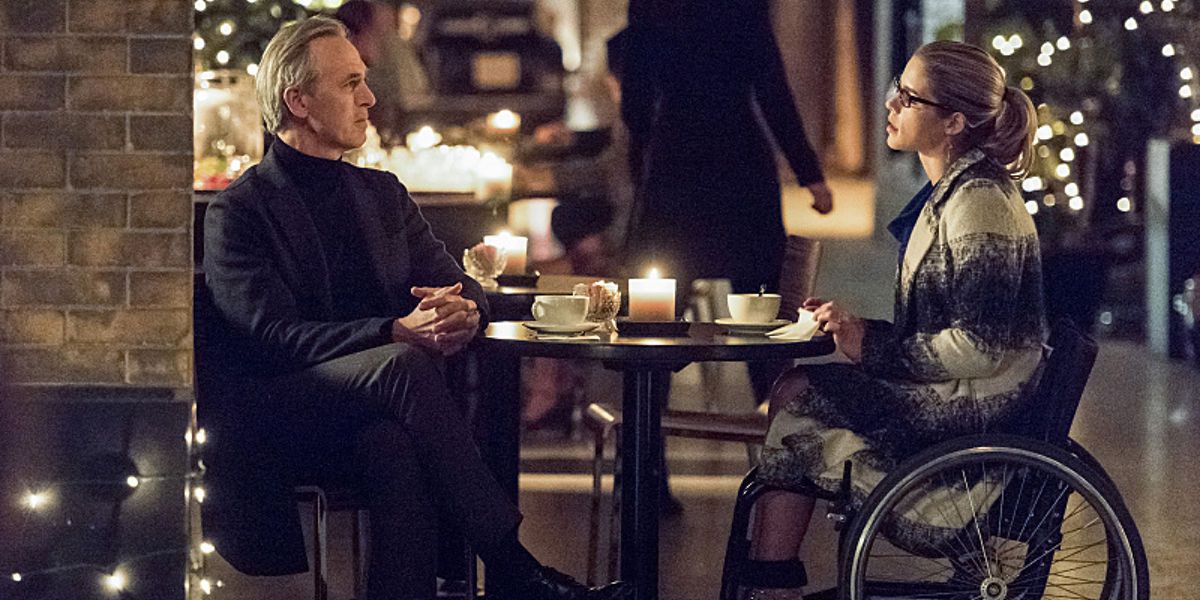[This is a review of Arrow season 4, episode 13. There will be SPOILERS.]
-
Arrow threw everyone for a bit of a loop during the closing moments of last week's episode. After several disparate threads seemed primed to go in separate directions for the foreseeable future, two significant story lines were suddenly tied together when a vengeful Nyssa al Ghul approached Oliver with a mystical cure for what's ailing Thea. But, like anyone associated with the League of Assassins, Nyssa's offer wasn't as altruistic as it first appeared. In other words, there was a major catch – if Ollie wants to get his hands on the lotus (which is neither a flower nor an expensive sports car), he would have to unseat the reigning Ra's al Ghul. And by league rules that means Malcolm Merlyn must relinquish his title or die, if his daughter is to live.
At this point in the season, ensuring Thea's survival by killing someone he's come to trust – and even rely on – doesn't seem like something Oliver would be willing to do. Just last week, Arrow made a point of highlighting Oliver and Malcolm's reconciliation, by having the former express his appreciation for his onetime nemesis, particularly when it comes to Merlyn's newfound commitment to his daughter – insatiable bloodlust or no. The scene was an interesting one, not only because it telegraphed Nyssa's proposition, but also because it hinted at the fluid nature of the characters on the show, and how the writers have been able to readjust Malcolm's position through more than simply making him the new leader of the League of Assassins. Though Malcolm may have been given a significant upgrade in terms of his clout in the DCTVU, he's also mellowed out in terms of his level of interaction with Oliver and the rest of Team Arrow. While the other members look at him warily, prior to 'Sins of the Father' it seemed as though Oliver had begun to view Malcolm as the last vestige of a family he had seen picked apart piece by piece since he boarded the Queen's Gambit with this father all those years ago.
A lot of this has to do with the function of John Barrowman on the show and what he brings in terms of a morally ambiguous character whose needs and desires sometimes intersect with those of the primary cast. What makes him interesting is that, as seen by his gathering a jar full of Savage-dust in the most recent Arrow/The Flash crossover, those needs are sometimes in service of something else – i.e., the interests of Ra's al Ghul and the League. That makes Malcolm a solid stand-in for other characters who have helped bring about some of the best storylines Arrow has seen in its nearly four-season run. And while Malcolm doesn't have the screen presence of, say, someone like Manu Bennett's Deathstroke, he is able to bring a much-needed personal connection to the series – one that went missing in the wake of Moira Queen's death and the subsequent loss of Walter Steele when his story line vanished along with his wife.
What 'Sins of the Father' attempts to accomplish with the hour, then, isn't just the maiming of Merlyn by Oliver's hand, but rather to reposition of the character in terms of his role in the larger Arrow storyline. There's plenty going on throughout the episode – some of which, like Nyssa's disbanding of the League of Assassins, is far more significant than the time allotted to it suggests – but really, the hour is about the question of whether or not people can change. And for the first time in what feels like a long time, the two primary plots of the episode seem to be on the same wavelength, as they investigate whether or not Malcolm has really become a kinder, gentler man since reconnecting with his daughter and assuming the title of Ra's al Ghul, while also wrapping up Felicity's own father issues with what appears to be a (temporary) conclusion to The Calculator plot.
Both story lines essentially follow the same path, but they also make good use of Arrow's history with family drama. Say what you will about the show, but it knows how to mine familial dysfunction for all it's worth, and with a hacktivist criminal in her family tree, it's nice to see Felicity getting a chance to compete with the Queens when it comes to dysfunction. And yet, as much as the hour was a return to form for Malcolm Merlyn, the same could also be said of the series itself. By the end of things, Oliver and Team Arrow have a new old villain coming after them, using Damien Darhk's resources to do it, but the episode also illustrated the ways in which finding common thematic ground between the A and B plots makes for a better hour of television.
In between setting up Legends of Tomorrow, sharing time with The Flash, and attempting to service both Oliver's mayoral campaign and the tragic events that recently befell Felicity, the series has been trying to keep so many different plates spinning it hasn't delivered much in the way of complete, fulfilling installments – beyond a handful of episodes to kick the season off, anyway. So for Arrow to utilize the question of whether or not people can actually change to bring Thea's bloodlust subplot to a close, reestablish Malcolm as a major antagonist, and offer Felicity her own plot, which sees her acknowledge and resolve a very personal conflict with her estranged father, it sets a bar for the season moving forward. 'Sins of the Father' might not be one of the show's best offerings – it does feel a little like The Calculator was given short shrift considering everything going on with Malcolm and Nyssa – but it was certainly one of the most focused, and that level of concentration paid off in the sense that the hour had a clear beginning, middle, and end.
It shouldn't be such a rarity for shows like Arrow to offer its viewers complete episodes, but with the responsibility of such an expansive, overarching narrative and the need to fill 20-plus hours every season, something is inevitably going to give. It shouldn't, but it does. 'Sins of the Father' offered one shocking, violent moment to make it stand out from a crowd of lesser episodes of late. And while a major character suffering an abrupt amputation is memorable, the hour should be recognized more for the thematic connections that, although admittedly facile, delivered a complete, satisfying episode from start to finish.
-
Arrow continues next Wednesday with 'Code of Silence' @8pm on The CW. Check out a preview below:



